 MyDogBreeds
MyDogBreeds Russian Spaniel is originated from Russia but Catalan Sheepdog is originated from Spain. Russian Spaniel may grow 10 cm / 3 inches shorter than Catalan Sheepdog. Russian Spaniel may weigh 9 kg / 19 pounds lesser than Catalan Sheepdog. Both Russian Spaniel and Catalan Sheepdog has same life span. Both Russian Spaniel and Catalan Sheepdog has almost same litter size. Both Russian Spaniel and Catalan Sheepdog requires Moderate maintenance.
Russian Spaniel is originated from Russia but Catalan Sheepdog is originated from Spain. Russian Spaniel may grow 10 cm / 3 inches shorter than Catalan Sheepdog. Russian Spaniel may weigh 9 kg / 19 pounds lesser than Catalan Sheepdog. Both Russian Spaniel and Catalan Sheepdog has same life span. Both Russian Spaniel and Catalan Sheepdog has almost same litter size. Both Russian Spaniel and Catalan Sheepdog requires Moderate maintenance.
 The Russian Spaniel is a gun dog which has originated from the English Cocker Spaniel and the English Springer Spaniel. Today while he is a gun dog he is more of a companion dog.
The Russian Spaniel is a gun dog which has originated from the English Cocker Spaniel and the English Springer Spaniel. Today while he is a gun dog he is more of a companion dog.
The Russian Spaniel has been spoken about since 1891. Different Spaniel breeds were imported to Russia to be used for hunting but some of the smaller spaniels weren't suited to the weather conditions.
At the beginning of the 20th century, breeding programs got underway for longer legged spaniels, and by the late 1930's there were a variety of different spaniels in Moscow.
After World War II, more purposeful breeding got underway and this led to the the Russian Spaniel standard in 1951. The popularity of the dog has increased and in 2002 the Russian Spaniel Club was set up in the United States. The dog isn’t recognised by any major kennel clubs.
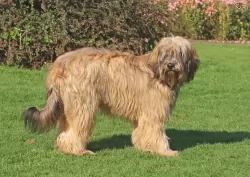 The Catalan Sheepdog, known also as the Gos d’Atura, hails from Catalonia, Spain. It is believed that the dog is related to the Portuguese- and Pyrenean Sheepdogs.
The Catalan Sheepdog, known also as the Gos d’Atura, hails from Catalonia, Spain. It is believed that the dog is related to the Portuguese- and Pyrenean Sheepdogs.
The standard for this breed was formulated in 1929. The sheepdog developed during Roman Empire times between 200 and 100 BC already, being used as livestock guard dogs. With the breed dwindling in the 1970s, Catalonian Sheepdog lovers started promoting it, but it remains a rare breed.
 The attractive little Russian Spaniel stands at 38 – 45cm in height ad weighs between 9 and 16kg. He is such a sturdy little dog too, looking very similar to the English Cocker Spaniel.
The attractive little Russian Spaniel stands at 38 – 45cm in height ad weighs between 9 and 16kg. He is such a sturdy little dog too, looking very similar to the English Cocker Spaniel.
The coat is short and silky with quite a bit of feathering around the legs and ears. Colors of the coat can be anything from reddish brown and white with freckles to black and white with freckles.
Aside from the Russian Spaniels' hunting abilities, they make great family pets and are playful with children.They’re devoted to their human families and become particularly attached to one person in the family.
Such devotion leads them to being a bit cool around strangers, not liking anyone unfamiliar to get too close to any of his family members.
He is intelligent and can be easily trained to obey simple commands such as sit, stay, lie down and come.
The Russian Spaniel can be happy in the suburbs, on a farm or in the city so long as he gets lots of attention and enough exercise.
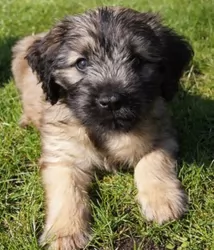 The Catalan is a medium sized dog but gives the impression of being bigger than he actually is. He stands from 45 – 55cm in height and weighs between 20 to 25kg.
The Catalan is a medium sized dog but gives the impression of being bigger than he actually is. He stands from 45 – 55cm in height and weighs between 20 to 25kg.
This breed also has double dew claws on the hind feet. He has a long coat which is slightly wavy and available in different shades such as fawn to brownish to dark grey to black. He has floppy, feathery ears and a fairly long, feathery tail. He has quite a bit of hair on he face too, so you’ll notice a beard, moustache as well as hair which covers the eyes somewhat.
Brave and courageous, the Catalan Sheepdog is also intelligent, active and hardy. He has a round face with a friendly, amicable expression. He is totally pleasant and sweet natured. However, in his role as guardian of sheep he took his role seriously, forming a strong relationship with both shepherd and sheep.
He is wary of strangers. Early socialization and training is always important, and while he makes a wonderful family pet, this training and socialization makes him more relaxed and obedient and he gets on well with children in the home as well as with other pets. While he is a placid, docile and gentle pet, he is also looked upon as a protector, and will defend his family.
 The Russian Spaniel is such an energetic, dog, full of life ad with the joys of being alive.
The Russian Spaniel is such an energetic, dog, full of life ad with the joys of being alive.
Although he was a gun dog, today he is loved for his companionship. He makes a splendid family pet and loves to be involved with the games of children.
He is easy-going and social, and just wants to spend as much time as he can with his human family. Give him all the love you have and you'll see his tail never stops wagging.
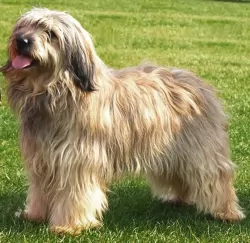 The Catalan Sheepdog is such an amicable character – he is going to make an awesome pet. He is an intelligent and obedient dog and is easily trained.
The Catalan Sheepdog is such an amicable character – he is going to make an awesome pet. He is an intelligent and obedient dog and is easily trained.
He has been used for guarding- and herding work and as a family pet makes a excellent guard dog as well. Capable of being gentle too, he is everything his human family wants him to be and just becomes a regular member of the family.
 With very few health problems, the feisty Russian Spaniel can get to 12-14 years of age. Nonetheless, there are always some of the more common health issues to look out for.
With very few health problems, the feisty Russian Spaniel can get to 12-14 years of age. Nonetheless, there are always some of the more common health issues to look out for.
Russian Spaniels are prone to developing ear infections. Ear infections can be terribly frustrating for a dog and they are quite difficult to clear up. It is advised that dog owners use ear cleaners before infection sets in. The vet can advise you on this as you have to be careful not to damage the inside of the ear.
Itchy skin can be another terrible frustration for a dog. Allergies often cause terrible itching, and your dog will go mad trying to gnaw and bite at the itch. Finding the specific cause of a skin allergy can be very challenging. Blood tests might be required. It is imperative to feed your dog some raw meat occasionally to avoid these terrible skin infections.
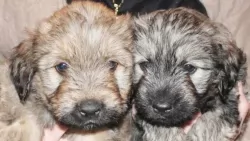 The Catalan Sheepdog is a fairly healthy breed and has a life expectancy of 12, 13 or 14 years. Nonetheless you will still need to watch out with common dog ailments with him, particularly hip dysplasia.
The Catalan Sheepdog is a fairly healthy breed and has a life expectancy of 12, 13 or 14 years. Nonetheless you will still need to watch out with common dog ailments with him, particularly hip dysplasia.
This is a joint and hip disease which can start with symptoms from 6 months of age already. Your dog will be hesitant to play and jump, doesn’t like to go upstairs, tires easily during a walk and develops a hop-like way to walk. You’ll notice that when he lies down, he battles to- or is reluctant to get up again.
X-rays may be required to confirm the diagnosis of hip dysplasia. There are different treatment options, all with the wellbeing of your pet in mind. You don’t want him to have a life of pain and lameness.
 This dog was raised to be a gun dog, and is used to having plenty of exercise. Most imperative for him will be a couple of walks each day plus lots of chase-the-ball games. These dogs just never seem to get tired as they are playful and will never let the chance of a game pass them by.
This dog was raised to be a gun dog, and is used to having plenty of exercise. Most imperative for him will be a couple of walks each day plus lots of chase-the-ball games. These dogs just never seem to get tired as they are playful and will never let the chance of a game pass them by.
Spaniel ears require quite a bit of upkeep as the hair can become extremely matted, forming balls of knotted hair. The inside of the ears must be constantly checked for infection. The spaniel’s coat will need to be brushed regularly and he can even go to the groomers and get a short Spaniel cut.
Contribute to your pet’s good health by providing him with top notch food. A good nutritious diet for the Russian Spaniel will give your dog less of a chance to get sick. Always go for the best quality commercially manufactured dog foods.
To provide your dog with just a bit of variety in his diet, some home-made food added into the dry kibble from time to time will delight your pet. No need to make preparing the food a huge issue either. Boil brown rice and chicken in a pot and add in sweet potatoes, carrots and spinach. Chop all this up, and as a treat, add smaller portions of it into the dry kibble.To avoid skin infections, try to include some raw meat into his diet occasionally.
Never leave your pet without a constant source of fresh, cool water
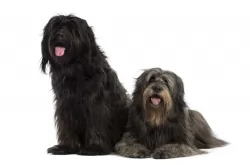 The Catalan Sheepdog is a working breed, so he is going to need plenty of exercise. While he adapts easily to city- or country life, it will be to his benefit to have a garden to romp in. You will still need to take him for walks and play ball- and rope games with him. This will prevent boredom and destructive behavior from him.
The Catalan Sheepdog is a working breed, so he is going to need plenty of exercise. While he adapts easily to city- or country life, it will be to his benefit to have a garden to romp in. You will still need to take him for walks and play ball- and rope games with him. This will prevent boredom and destructive behavior from him.
The Catalan Sheepdog has long hair so he will need to be brushed twice a week to avoid matting. This will help to remove loose hair too, but also distribute natural oils through his coat, keeping his hair and skin healthy and free from skin rashes and itchiness.
This brushing ensures other benefits as you can simultaneously check him for parasites such as fleas and ticks.
If you feed him commercial dog food, make sure its a high quality one. He is an active breed so will require high protein. Give him some homemade rice, vegetables and meat, and include raw meat in his food from time to time too. Always ensure that there is fresh, cool water constantly within reach.